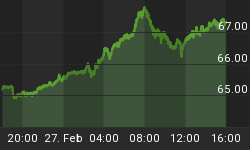Here's something you don't see very often: For a day and a half this week, the Japanese government's benchmark 10-year bonds attracted not a single successful private sector bid. At today's artificially-depressed yields, no one wants this paper -- except of course the Bank of Japan, which is buying up the bonds with newly-created yen. As the Gulf Times noted:
Japan bond market liquidity dries up as BoJ holding crosses ¥200tn
The Bank of Japan's massive purchases of government debt hit a milestone this week, sucking liquidity out of the market to such an extent that the benchmark 10-year bond went untraded for more than a day, the first time in 13 years.Data from the BoJ late on Monday showed its holding of Japanese government bonds topped ¥200tn ($1.96tn), or about 20% of outstanding issuance - up by more than half from ¥125tn about a year ago.
The fall in market liquidity looks set to intensify as the BoJ has vowed to continue its aggressive buying for at least another year, with market players expecting it to expand its easing some time later this year.
"Everybody thinks the market is not going to move for the time being because of the purchase by our dear customer, the BoJ," said a trader at a major Japanese brokerage.
The BoJ stepped up its bond buying last April when Haruhiko Kuroda became its governor, vowing to take radical easing steps to end deflation once and for all.
The increasing dominance of the BoJ in the market, however, resulted in shortage of tradable bonds in the market, reducing trading flows between market players.
Brokers are reluctant to go short, fearing that they cannot buy back when they want. On the other hand, few investors are willing to chase prices higher, when the 10-year bonds yield about 0.6%
The upshot was that the average daily trading band of 10-year JGB futures price so far this month is 0.15, compared to about 0.50 in the 10-year US Treasury notes futures.
The current 10-year cash bonds saw its first trade of the week yesterday afternoon, having gone untraded for more than a day and a half.
Trade volume in the benchmark cash bonds so far this month dropped to less than one trillion yen, down about 70% from the same period last year.
In a sign that the BoJ is also worried about falling bond market liquidity, the central bank tweaked its JGB repo programme on Monday, saying it will offer to sell JGBs twice a day, compared to once a day now.
Yet traders shrugged off the measure as a drop in the ocean. And with the BoJ seen mopping up another ¥60tn-¥70tn of JGBs from the market, few investors are ready to pick up a fight.
"Everybody is holding off buying now only because they want to buy at a higher yield. But in the end, the only strategy you can take under an environment like this is buy more given the shortage of what you can buy," said Takeo Okuhara, fund manager at Daiwa SB Investments.
One reason many investors are cautious about buying despite tight market conditions is the trauma of sharp reversal in the market rally after the BoJ adopted the current policy last April.
The 10-year JGB yield hit a record low of 0.315% on the following day after the BoJ's easing, only to jump back to 1% about a month later - a scenario market players think can be repeated, given the fall in liquidity.
"I know this could end badly. But if you are in this market, you will have no choice but to buy," Daiwa SB's Okuhara said.
What exactly does this mean? Well, it's definitely weird. These are the most important fixed income instruments of the world's third biggest economy, and the only entity willing to own them is the government that issues them. The rest of the world now refuses to lend money for ten years at 0.6% to a government whose debt is 200% of GDP and rising, which leaves Tokyo with only two choices: monetize virtually all its future borrowing or allow interest rates to rise and pay two or three times as much in interest going forward. The latter choice would hobble, if not cripple, an economy that can only function when borrowed money is nearly free.
Here's a brief interview with prominent Japan bear Kyle Bass noting the country's "terrible" bond predicament.
In a world of markets rather than manipulations, this kind of imbalance would be an automatic short candidate. Actually, this kind of imbalance would never occur because it would be arbitraged out of existence long before it reached such an extreme. But today, when governments brazenly set prices for just about everything, there's no reason why the Bank of Japan can't simply decree a rate of zero or -1% or whatever it wants. As the trader notes at the end of the above article, this can't end well. But exactly how and when it ends is anybody's guess.















